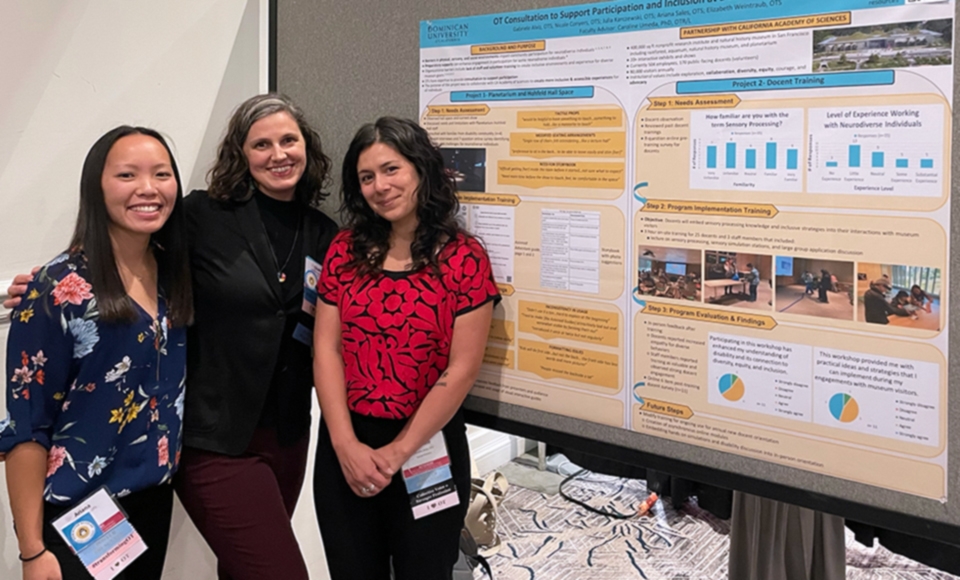Breadcrumbs
- News
- News Archive
- OT Students Present California Academy of Science Work at National Conference

Graduate students from Dominican University of California’s occupational therapy program have developed a series of resources and protocols now being used at San Francisco’s California Academy of Sciences to support community access and inclusion for diverse populations, including people with sensory, social and learning disabilities.
The work, which the students presented at the American Occupational Therapy Association national conference in Florida last month, was done under the direction of Dr. Caroline Umeda, assistant professor of Occupational Therapy in the School of Health and Natural Sciences.
The students involved with the work are: Gabriele Alviz, Nicole Conyers, Julie Karczewski, Ariana Sales, and Elizabeth Weintraub.
Dr. Umeda’s research interests include community and cultural arts accessibility for children with disabilities and their families and the role of occupational therapy consultation in developing access programs. Much of Dr. Umeda’s work has occurred within the theater context with professional and community theaters, including Seattle Children’s Theatre, to develop and implement sensory friendly theater performances and programs.
With the Cal Academy of Sciences project, Dr. Umeda mentored the OT capstone students to learn how to do this type of OT consultation in the community. The students worked with two departments within the museum: the Planetarium and Volunteer Services.
For the planetarium, the students worked with Academy on accessibility at Hohfeld Hall, a space outside the planetarium itself where daily shows on space/astronomy-related topics are provided to the public.
The work started with a needs assessment – including consulting with staff and families from the disability community – and then program implementation, training, and evaluation. This assessment helped students determine the need for storybooks and visual guides that visitors could use before and during the show.
“We helped the staff create more resources for more inclusive presentations,” Umeda says. “The guides are geared toward anyone, including the families that come through with young children.”
“When someone with an intellectual disability or a comms challenge attends a presentation, words are just coming at them,” Umeda explains. “It is often difficult to follow what the presenter is saying. Research shows that visual guides can support engagement and understanding of some people with disabilities who engage better with words and pictures versus listening to spoken words. Many people without disabilities also have visual learning preferences, and these guides benefit them as well.”
The storybook guides feature photographs to help someone without auditory processing to follow a show. The photos represent the key content presented in the show – including images of the sun and asteroids – but in more of a ‘scavenger hunt’ type of format.
“During the show, a presenter talks about asteroids. So, our students created a guide that someone could hold onto, look at the photos, and check off what the presenter had talked about,” Umeda says. “Pictures allow someone with communication challenges to connect with the presentation without needing to hear all the words.”
The OT students also partnered with volunteer services at the museum to develop training for docents who interact with academy visitors. The training covered general concepts related to the social model of disability and sensory processing.
The training was held last spring with 11 participants.
“We hope this training will provide docents with a framework to better understand the behaviors and needs of museumgoers with sensory, social, and learning differences, and give them the tools needed to provide these patrons with meaningful engagement opportunities at the museum,” Umeda says.
After the training, the OT students conducted surveys and collected data to determine effectiveness. The docents reported increased empathy for diverse behaviors, while the museum staff observed strong docent engagement during the training.
The work with the Academy of Sciences will continue with a new team of OT students. The new team is conducting Universal Design for Learning training for Planetarium presenters to build capacity around supporting the engagement and participation of diverse museum visitors.
Dr. Umeda has taught in academic, clinical, and community-based contexts, and was on clinical faculty at the University of Washington from 2008 to 2015. She joined the Department of Occupational Therapy at Dominican University of California in 2018.